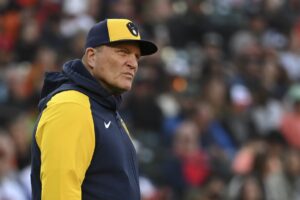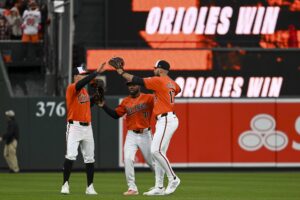Every baseball fan knows that the trade deadline is here. Teams are looking to add that missing piece for a playoff run or sell high on veterans. Now imagine a reverse deadline where instead of adding missing pieces, contenders had to sell or cut their worst piece instead. Buyers become sellers and sellers become buyers. This is:
Reverse Deadline: The MLB Trade Deadline
What makes this interesting is that it does not take age, salary, or years of control into account. Last season, the Philadelphia Phillies were in contention for most of the year. They also had a well-regarded prospect named Scott Kingery. He finished the year with negative fWAR, but is on pace for a 3 fWAR season this year. In the reverse trade deadline, they might not be allowed to wait for his improvement. If he is their worst player, he’s gone to a rebuilding team.
Sometimes it will be boring. For example, the Los Angeles Dodgers have the best record in the game precisely because they have no one truly awful. They’d have to trade Yimi Garcia this year. No one cares about Yimi Garcia. But sometimes, something interesting happens.
The Astros Get Robbed
The Houston Astros have the best record in the American League — one game behind the Dodgers for best overall. However, in this new universe, their early-season gamble on Corbin Martin will cost them dearly. He pitched poorly in five starts before requiring Tommy John surgery, leaving him with -0.5 fWAR for the season — the worst mark on the club. After appearing on several top 100 lists entering the season, there is no chance that a rebuilding team lets Martin pass them by.
Likely landing spots: Baltimore Orioles or Seattle Mariners. The Mariners are running Tommy Milone and Wade Leblanc out following openers, and the Orioles second-best pitcher is 30-year-old Asher Wojciechowski who has yet to earn a full season in the big leagues.
The Yankees Get Ripped Off
The New York Yankees are one game behind the Astros for the best record in the American League. Entering the season, Miguel Andujar projected to be a big part of that. However, a partially torn labrum kept Andujar out for the early part of the season, and the Yankees truly regret letting him ever return. For the year, Andujar compiled an astonishing -1.1 fWAR in just 12 games. While that proves he was not healthy, it also makes him the worst-performing member of the team. Rumors circulate that Andujar actually is available for pitching, but in this universe, the Yankees have no such leverage, and Andujar probably ends up on the Detroit Tigers for a pittance.
The Athletics Get ‘Krushed’
The Khris Davis extension isn’t working out for the Oakland Athletics. After being Mr. .247 for four straight seasons, hip and hand injuries have all but negated Davis’ prodigious power. With -0.6 fWAR on the year, Davis stands as the Athletics worst player, and a near-certain bet to end up on a Miami Marlins team desperate for power. A healthy Davis would help anyone, but rules are rules, and the Athletics have to lose him.
The Cubs Get K’ed
The Chicago Cubs major 2019 signing didn’t occur until June when one of baseball’s best closers for the last eight years finally signed. Perhaps it was the extended stay on the market, or perhaps the wind keeps blowing out at Wrigley, but Craig Kimbrel has not been himself yet this year. In less than two months since his signing, he has accumulated -0.6 fWAR, good for the worst mark on the club. Maybe someone wants him and gives the Cubs a small break, or maybe they simply have to cut him. Whatever the outcome, this goes down as a failed signing for the Cubs, and Kimbrel attempts to rebound with another club.
Other Reverse Deadline Names To Note
The Minnesota Twins are forced to part with every free-swinger’s spirit animal, Mr. Willian Astudillo. The Milwaukee Brewers lose a 30 home run threat in Travis Shaw. The Atlanta Braves send Johan Camargo, 2018’s starting third baseman, packing after he dropped from 3.3 fWAR to -0.5. The Washington Nationals are in danger of losing top shortstop prospect Carter Kieboom, while the Cleveland Indians could lose former top 100 prospect, Bobby Bradley.
The Reverse Results
Interestingly, every contending team has at least one player with negative fWAR. Ergo, in the short term, all these moves represent addition by subtraction for the contending clubs. Shedding negative results improves the product on the field, even if it comes at the cost of future development or eating a big contract. That said, the quality of most of the available players (Yimi Garcia aside), cannot be denied. There is every chance that a reverse deadline would be remembered just as fondly by rebuilding clubs as John Smoltz for Doyle Alexander, Jeff Bagwell for Larry Anderson, or Gleyber Torres for Aroldis Chapman (though after 108 years without a title, it is hard to blame the Cubs). Davis, Andujar, Kimbrel, and Martin could all significantly alter a rebuilding timeline, and would all represent a significant loss to their current club.
Final Thoughts
In the end, no matter what format it takes, the trade deadline is always a seller’s market. Nevertheless, there is no incentive for a rebuilding team to trade a piece for a return it does not like. Major League Baseball thought it would increase the excitement of the trade deadline by consolidating it. However, with free agency a gamble, clubs are increasingly prone to signing their prospects to long-term deals and being tight-fisted with their prospects as a result. If baseball wants a truly action-packed trade deadline, it might need to fix free agency first.
Main Photo:
Embed from Getty Images






